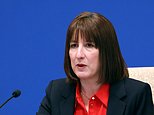We're all regularly told of the benefits of getting at least seven hours of sleep a night.
But a new survey shows that most of us are getting significantly less than this.
Researchers from Lingo by Abbott surveyed 2,000 Britons to find out exactly how much shut-eye people across the UK get.
The results revealed that the average Briton gets just six hours and 20 minutes of sleep a night.
And it's particularly bad news for people in Sheffield, who were found to be the tiredest in the UK.
Sixty per-cent of people in the Steel City said they're constantly tired, compared to the national average of 48 per cent.
Sophie Bertrand, resident nutritionist at Lingo, said: 'These results show how tired the nation is, with as many as half of us complaining that we are always exhausted.
'This could be for several reasons…we may be overworked, stressed, consuming a diet that lacks nutrition or not moving our bodies enough.'


While Sheffield came out as the tiredest city, this was closely followed by Glasgow (58 per cent constantly tired), Plymouth (57 per cent), Brighton (56 per cent), and Cardiff (55 per cent).
In terms of bedtime, the average Briton now heads to bed at 10pm.
However over-69s stay up later than other cohorts, with an average bedtime of 10:20pm.
In contrast, people aged 18-44 prefer an early night, ending the day at 9:40pm on average.
The survey also revealed which professions struggle the most with fatigue.
Hairdressers topped the list, with 73 per cent admitting that they're constantly tired.
This is followed by lawyers (72 per cent), people who work in HR (71 per cent), charity workers (67 per cent), and people who work in logistics (63 per cent).
According to the NHS, the amount of sleep you need will vary depending on your age, as well as several other factors.

'A healthy adult usually needs around 7 to 9 hours of sleep,' it explains on its website.
'However, age, health and personal circumstances affect how much sleep we need, plus some people naturally sleep more than others.
'Teenagers, children and babies need more sleep because they are still growing, but that varies, too, with a newborn sleeping anywhere between 8 to 16 hours.'
If you're not getting enough sleep, it could be down to several reasons.
'Some people are naturally lighter sleepers or take longer to get to sleep while others might sleep badly because of anxiety, worry over stressful events or other life challenges,' the NHS added.
'There are lots of things that can influence how well we sleep, such as our current physical or mental health, our upbringing, things that happen to us, and even our temperament.
'However, bad sleep habits or poor sleep hygiene, such as not relaxing or winding down before bed, often cause sleep problems.'












